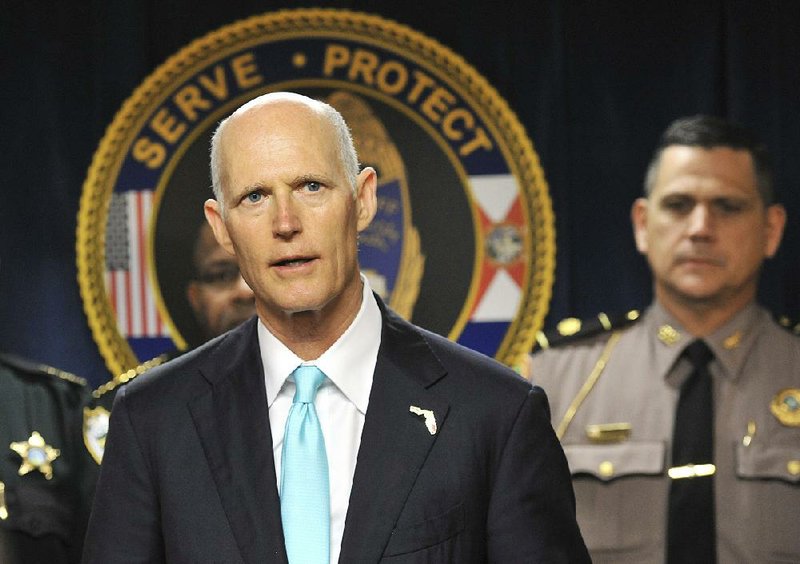TALLAHASSEE, Fla. -- Three weeks after the Parkland high school shooting, Florida Gov. Rick Scott has a gun-control bill on his desk that challenges the National Rifle Association but falls short of what the Republican and survivors of the massacre demanded.
Now he must decide whether to sign it. Scott has not said what he will do, and he plans to take up the issue today with relatives of 17 people slain in the Feb. 14 attack at Marjory Stoneman Douglas High School.
"I'm going to take the time, and I'm going to read the bill and I'm going to talk to families," he said Wednesday.
State lawmakers formally delivered the overhaul package Thursday. The governor has 15 days to sign it, veto it or let it become law without his signature.
The measure would raise the minimum age to buy rifles from 18 to 21 and extend a three-day waiting period for handgun purchases to include long guns. It would also create a so-called guardian program enabling school employees and many teachers to carry handguns if they go through law enforcement training and their school districts agree to participate.
Other provisions would create new mental health programs for schools, and establish an anonymous tip line where students and others could report threats to schools. The bill would also ban bump stocks that allow guns to mimic fully automatic fire and seek to improve communication among schools, law enforcement and state agencies.
In other developments Thursday, the Broward County sheriff's office released 12 minutes of radio transmissions from its deputies and a neighboring police agency that highlighted the chaos the day of the attack. That material also included 10 of the 81 recordings of calls by students and parents to a 911 center.
The excerpts showed that a deputy on school grounds first thought the bangs were firecrackers but quickly realized that they were gunshots -- yet he never ran toward them. Other responding deputies and officers desperately tried to sort through a chaotic scene, treat the injured, lock down the school and locate the shooter.
In the shooting aftermath, Florida's governor broke with the NRA. Scott had received top marks from the lobbying group in the past for supporting gun-rights measures and his new stance reinvigorated the gun-control movement.
The governor has called for raising the minimum age to purchase any type of gun, but he does not support arming teachers. Instead, he wanted lawmakers to adopt his $500 million proposal to put at least one law enforcement officer in every school.
The NRA opposes raising age limits to buy weapons or imposing new waiting periods. In a statement Thursday, NRA and Unified Sportsmen of Florida lobbyist Marion Hammer called the bill "a display of bullying and coercion" that would violate Second Amendment rights and punish law-abiding citizens.
President Donald Trump congratulated Florida on the legislation, saying state lawmakers "passed a lot of very good legislation last night." During a Cabinet meeting, Trump said the White House was working on a plan to ban bump stocks and that efforts to enhance background checks were "moving along well" in Congress.
In the U.S. Senate, Majority Whip John Cornyn, R-Texas, said a gun safety bill he crafted with support from both parties should reach the crucial 60-vote hurdle it needs to advance.
The proposal brings together unusual allies: Trump, the NRA, and the pro-gun safety group Everytown for Gun Safety.
It would still need approval from the GOP-controlled House before going to the president's desk. The House already passed a version of the bill, attached to a proposal that would allow people with concealed carry permits to take their guns across state lines.
Cornyn's bill penalizes federal agencies that don't accurately share criminal records with the National Instant Criminal Background Check System. That system is used to screen people seeking to purchase guns for criminal histories.
Cornyn says his Fix NICS bill could have prevented a shooting that left 26 dead in Sutherland Springs, Texas, in November. In that case, felony records were missing from the shooter's file, allowing him to pass a background check.
Another bipartisan proposal would allow federal courts to keep guns away from people who show warning signs of violence.
Sen. Lindsey Graham, R-S.C., and Richard Blumenthal, D-Conn., said Thursday at a news conference that their bill is a common-sense proposal to save lives.
The bill is modeled on state "red flag laws" that let officials take guns away from people who are judged to pose an imminent danger to themselves or others. A federal law would fill gaps in state laws, Graham said, noting that only a handful of states allow gun-violence restraining orders.
Police and the FBI received numerous warnings about 19-year-old Nikolas Cruz, the accused Florida shooter, but did not move to take away his guns.
Separately, a student injured in the shooting was transferred to intensive care after his condition worsened. A hospital spokesman said 15-year-old Anthony Borges' condition became critical overnight Wednesday.
A family attorney did not immediately respond to a request for information. The student has filed notice that he will sue Florida authorities to seek money to cover the cost of his recovery.
In another development, an attorney for the family that took in Cruz, a former Stoneman Douglas student, after his mother died said the gunman exchanged text messages with their son moments before opening fire.
Cruz asked the son of James and Kimberly Snead which classroom he was in and who his teacher was, lawyer Jim Lewis said Thursday. Their son was not wounded, he said.
Information for this article was contributed by Brendan Farrington, Gary Fineout, Jennifer Kay, Adriana Gomez Licon and Matthew Daly of The Associated Press; and by Andrea Drusch of the Tribune News Service.
A Section on 03/09/2018
